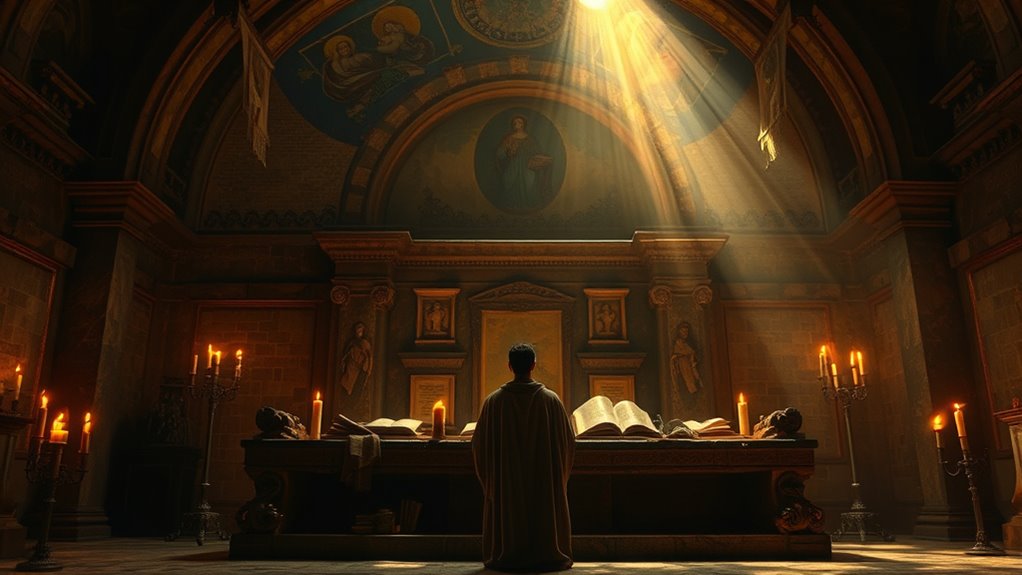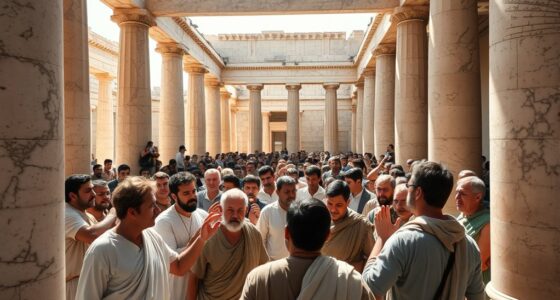Ancient skeptics questioned gods by critically examining myth stories, revealing human motives, moral contradictions, and societal roles behind divine narratives. They challenged the idea of infallible beings, often exposing gods as human-made projections reflecting fears and hopes. Their critiques encouraged deeper reflection on religious authority and morality, fostering a space for dialogue and understanding. If you’re curious, you’ll discover how this skepticism shaped philosophical ideas and changed perceptions of divine power over time.
Key Takeaways
- Ancient skeptics questioned gods’ morality, motives, and stories, often exposing inconsistencies in myth narratives.
- They viewed gods as human constructs reflecting societal fears, hopes, and values rather than infallible beings.
- Skeptics used myth critique to challenge divine authority and promote critical thinking about religious claims.
- Their questioning aimed to understand divine stories’ deeper meanings and prevent dogmatism in belief systems.
- These critiques laid the groundwork for philosophical inquiry into divine power, morality, and human understanding.

Throughout history, questioning the gods has challenged believers and skeptics alike, sparking debates about faith, power, and existence. When you explore ancient perspectives, you’ll find that divine doubt was more than mere skepticism; it was a fundamental way to understand and challenge the stories that shaped societies. Many early thinkers didn’t accept myth narratives at face value. Instead, they engaged in myth critique, examining the stories about gods to uncover inconsistencies or motives behind their creation. This process allowed them to see gods not as infallible beings but as human constructs—projections of societal fears, hopes, and values. Recognizing the importance of myth critique helps to understand how these skeptics questioned authority and sought deeper truths. Your curiosity about divine doubt reveals an essential aspect of how ancient skeptics questioned authority. Instead of blindly accepting divine claims, they scrutinized the stories and rituals surrounding gods, often exposing contradictions or moral dilemmas within mythologies. For example, some skeptics pointed out how mythological tales portrayed gods as capricious or unjust, challenging the idea that divine beings were morally perfect or omnipotent. Their critiques didn’t necessarily mean rejecting the gods outright but aimed to understand the stories’ deeper meanings or question their societal functions. This approach fostered a more nuanced view, where divine figures served as symbols rather than literal entities.
By engaging in myth critique, these early thinkers encouraged others to think critically about religious teachings. They believed that blindly accepting divine authority could lead to dogmatism, preventing genuine understanding or moral growth. Instead, questioning the gods opened up space for dialogue, debate, and reflection on human nature and morality. Such skepticism wasn’t seen as rebellious but as an intellectual exercise aimed at revealing truth and encouraging moral integrity. Their challenges to divine narratives often served as a foundation for philosophical inquiry, inspiring later thinkers to explore the nature of existence and divine power more deeply.
Frequently Asked Questions
Did Ancient Skeptics Influence Modern Secular Thought?
Yes, ancient skeptics influenced modern secular philosophy and rational inquiry. You can see their impact in how you question dogmas and seek evidence-based answers today. Their emphasis on critical thinking and skepticism laid the groundwork for scientific methods and secular ideas. By challenging traditional beliefs, they helped shape a worldview that values reason and empirical evidence, inspiring your pursuit of knowledge free from religious influence.
How Did Skeptics’ Views Differ Across Various Ancient Cultures?
Imagine a tapestry of beliefs where skeptics paint different strokes across cultures. You see that in ancient Greece, skeptics like Pyrrho questioned divine certainty, embracing doubt. In India, similar philosophical differences appeared, with skeptics challenging religious dogmas through doubt and inquiry. Meanwhile, in China, skeptics like those in Daoist thought questioned rigid doctrines, highlighting cultural variations. Your understanding shows that these skeptics’ views varied, reflecting each culture’s unique approach to faith and reason.
Were There Prominent Female Skeptics in Ancient Times?
Yes, there were prominent female skeptics in ancient times. You’ll find female philosophers and ancient women who questioned religious beliefs and challenged divine authority. For example, Hypatia in Alexandria was a noted philosopher who engaged in critical thinking beyond religious dogma. These women played essential roles in fostering skepticism, showing that questioning the gods wasn’t solely a male domain, and their contributions helped shape philosophical debates across cultures.
What Specific Arguments Did Skeptics Use Against Religious Dogma?
Imagine peeling back the layers of a divine onion—skeptics argued that miraculous claims often hid natural explanations, not divine intervention. They questioned why gods would perform selective miracles, suggesting humans fabricated stories to control or comfort. Skeptics pointed out inconsistencies in religious texts, highlighting that divine intervention seemed too convenient or improbable to trust blindly. Their sharp arguments cut through dogma, urging people to seek reason over superstition.
How Did Skeptics’ Beliefs Impact Their Daily Lives and Communities?
Your skeptical beliefs influence how you engage with community interactions and moral decision making. You question traditional norms, which encourages open dialogue and critical thinking among your peers. This mindset fosters a community where diverse viewpoints are valued, and ethics are based on reason rather than dogma. By challenging accepted beliefs, you help promote moral growth and intellectual honesty, shaping a more thoughtful and questioning society around you.
Conclusion
Just like a traveler questioning the stars guiding their path, you might wonder if the gods truly illuminate our way or merely cast shadows. Ancient skeptics, like cautious explorers, refused to accept the glowing myths without doubt. Their curiosity kept them searching beyond the skies, seeking truth amid the darkness. Remember, it’s your journey to decide which light to follow—whether the steady flame of reason or the flickering shadows of belief. The choice is yours to make.









